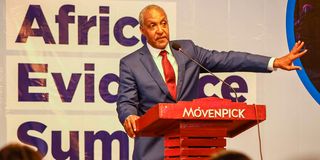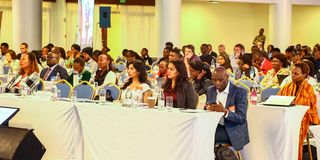Aid cuts: How researchers want Africa to cope

Ambassador and Special Envoy of the East Africa Community Facilitator on DRC, Macharia Kamau, during the 2025 Africa Evidence Summit in Nairobi on June 24, 2025.
Researchers say that aid cuts, such as those implemented by the US government on donor-funded programmes in Africa, should influence a shift in mindset: prioritising funding for the most important areas.
These ideas arose at the 13th Africa Evidence Summit in Nairobi this week, where researchers and policymakers involved in key sector programmes gathered to discuss ways forward in times of limited funding.
The first step, they argued, is to ensure that data on African communities, for whom these programmes are intended, is properly stored. What is the other solution? Policymakers should invest in projects that demonstrate value to the people.
They proposed frugal spending and transparency as a way of dealing with the shortage of money.
On a panel labelled ‘The shifting landscape of foreign aid’, the options available to Africa were discussed.
Macharia Kamau, a former Kenyan diplomat who also served as special envoy of the East African Community Facilitator on the DRC, said that Africa's transition should be driven by evidence on how best to invest in programmes such as those relating to health, education, climate change and peace on the continent.
Africans sidelined
“The voices and knowledge of hundreds of millions of people, especially in Africa, remain sidelined or under-represented. Evidence is about more than just numbers and spreadsheets,” he said.
“Research by Africans, for Africans — in partnership with the world — is not just a slogan. It’s a necessity,” he declared.
He was arguing about the absence of African participants in the design of programmes, or even products that they are to consume.

Guests during the 2025 Africa Evidence Summit in Nairobi on June 24, 2025.
Mr Kamau cited troubling reports of medications developed using data that ignore African biology, lived experiences and health ecosystems — a failure that he described as scientifically indefensible. He argued that this exclusion weakens clinical care, erodes public trust in health systems, and perpetuates inequitable outcomes, ultimately limiting the global understanding of health challenges.
At the Summit, some experts argued that researchers should also be equipped with local tools, saying most of the programmes are implemented using perspectives of the West.
Carson Christiano, Executive Director of the Center for Effective Global Action (CEGA), said the importance of high-quality research in Africa is that it could help policy makers prioritise what is important.
“At a time when the global landscape is shifting, marked by the closure of USAID initiatives, our work demands greater urgency than ever.”
The US, the world's largest aid donor, earlier this year cut most of the aid that had come to developing countries via USAID. It provided some $72 billion in assistance in 2023.
According to Kenya’s Treasury Cabinet Secretary John Mbadi, these cuts left Kenya with a Sh52 billion ($400 million) deficit in the 2024–25 financial year.
It also sent shockwaves to UN agencies such as the United Nations Refugee Agency (UNHCR) and the World Food Programme (WFP) which had relied on USAID.
WFP had already warned that refugees in Kenya are at risk of increased food insecurity due to critical funding shortages, forcing the agency to reduce food assistance to the lowest levels ever recorded.
720,000 refugees
According to the agency, 720,000 refugees in Kenya rely on their support. Yet, unless more funding arrives, starting this month, food rations will be slashed to just 28 per cent, and cash assistance will be cut entirely.
The UN is appealing for substantial financial support for Sudan and Somalia, with a combined ask of over $6 billion to address humanitarian crises in both nations.
At the Nairobi conference, participants argued funders and policymakers are increasingly relying on credible evidence to optimise decision-making and maximise the impact of their investments.
Prof Dean Karlan, co-director of the Global Poverty Research Hub, said that even when aid was substantial, it was still a smaller fraction of African budgets. Based on this, Karlan said that one way to leverage cuts is to build evidence partnerships to help governments spend their budgets as effectively as possible.
“It is far more than anyone’s research or study. What we are learning is that the collection of evidence is what will enable us to move forward and learn from each other,” added Karlan, former chief economist at USAID.
He noted that one of the lessons learned at USAID was that they could achieve more by simplifying programmes and focusing.
Catherine Kyobutungi, the Executive Director of the African Population and Health Research Center (APHRC) said agencies should collaborate more to reduce overlapping functions.
“We need functional models that establish and maintain relationships beyond short-term funding cycles,” she said.
“The key question isn’t just whether there’s an excellent scientist at Makerere University, for example, but how to consistently and sustainably connect that researcher with decision-makers. Is there a framework to ensure their evidence directly informs policy”
The two-day Summit, on June 23-24, was co-hosted by the Center for Effective Global Action and the Network of Impact Evaluation Researchers in Africa.





